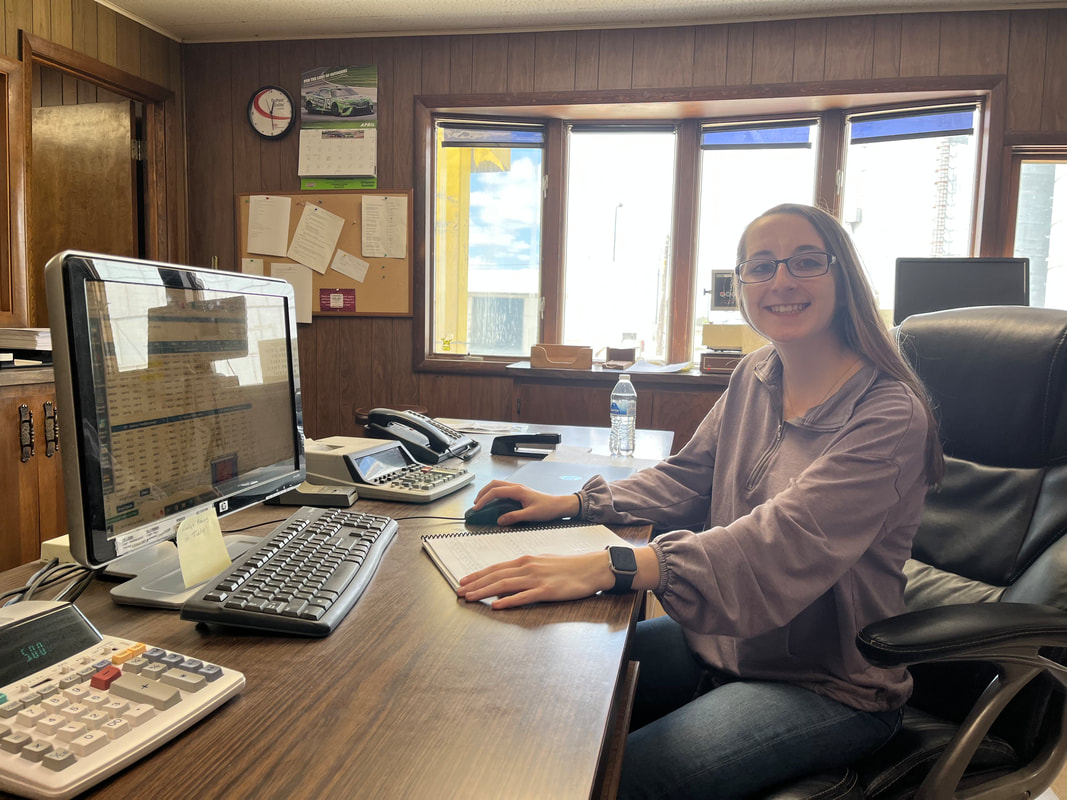|
Hello, again! For a brief reintroduction, my name is Halie Kohl and I reside in Herscher, IL.
Coming from a grain and livestock family, I developed my passion for agriculture quickly. Since May 2020, I have owned and operated Halie’s Farmstand, a small vegetable production business. I am currently a college sophomore agribusiness major, dually enrolled at Kankakee Community College and Illinois State University. Upon college graduation, I aspire to develop Halie’s Farmstand into a larger farm-to-fork operation with an emphasis on commercial tomato production and continue raising livestock. For my spring job-shadowing days, I returned to Rabideau Grain and Lumber. While the spring-time is busy for farmers in the fields, it can be rather slow at the elevator. I received a settlement statement from Incobrasa (Gilman, Illinois) for beans which Rabideau Grain hauled to them via semi. I matched up Rabideau’s outbound weight tickets for the trucks to Incobrasa’s weight tickets and reconciled the statement in their computer system. The office manager, Bev Buckley, and office assistant, Lisa Patchett, took this time to explain to me their grain transportation methods of railcars verse semis, buyers, and end users. In addition to doing business with Incobrasa, Rabideau Grain ships corn via CN railroad to chicken farmers in Mississippi and trucks corn to One Earth ethanol plant in Gibson City, Illinois. Railcars allow elevators to ship mass amounts of grain in a short period of time. Approximately 4 semis fit in 1 railcar (approximately 4,000 bushel per hopper). Plus, the consignee of the railcars pays the freight charges. Rabideau Grain plays a smaller role with railroad shipments, handling only 25 rail cars at a time. At first utilizing railroads seems simple, but I have learned that grain elevators are truly at the railroad’s mercy. After the rail cars are delivered, CN only allows one free day and one loading day to get the cars ready for pick-up, regardless if the drop time was 11:59 PM or 12:01 AM. Within this timeframe, Rabideau Grain must have Champaign County Grain Inspection do a stowage inspection on all cars, have employees load all cars, Champaign County Grain Inspection returns to take samples and produces a certificate of grain grade, FM, etc., then the cars are sealed, and submitted for release. If all pieces of the puzzle do not come together within the allotted CN timeframe, demurrage occurs and each car is docked $200/day. On a full set of 25 rail cars, Rabideau Grain risks losing $5,000/day due to inclement weather, breakdowns, etc if they cannot get all cars loaded. Moving off the rails and back onto the roads, semis also play a large role in the transportation of grain. Rabideau Grain owns 5 trucks. When trucking grain to Incobrasa or One Earth, each load is weighed outbound and then when it arrives at its destination. Prior to hauling, a price is settled on between Rabideau and Incobrasa or One Earth, and the elevator is already price protected by hedging the grain. Comments are closed.
|
Grain & Feed Association of Illinois3521 Hollis Dr. Archives
April 2024
Categories |
|
Grain and Feed Association of Illinois. All Rights Reserved.
3521 Hollis Drive | Springfield, IL 62711 Phone: (217) 787-2417 | [email protected] | sitemap |


 RSS Feed
RSS Feed